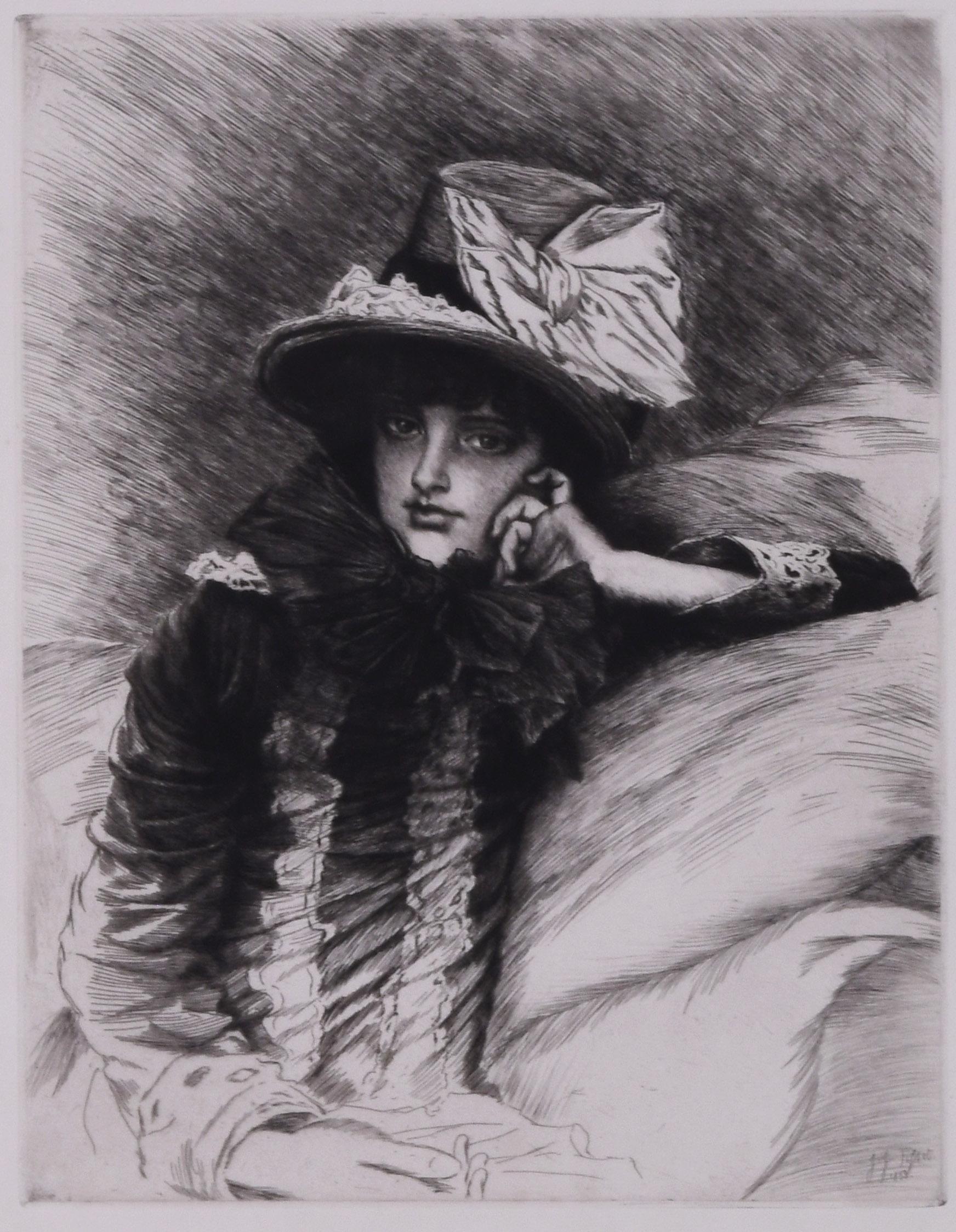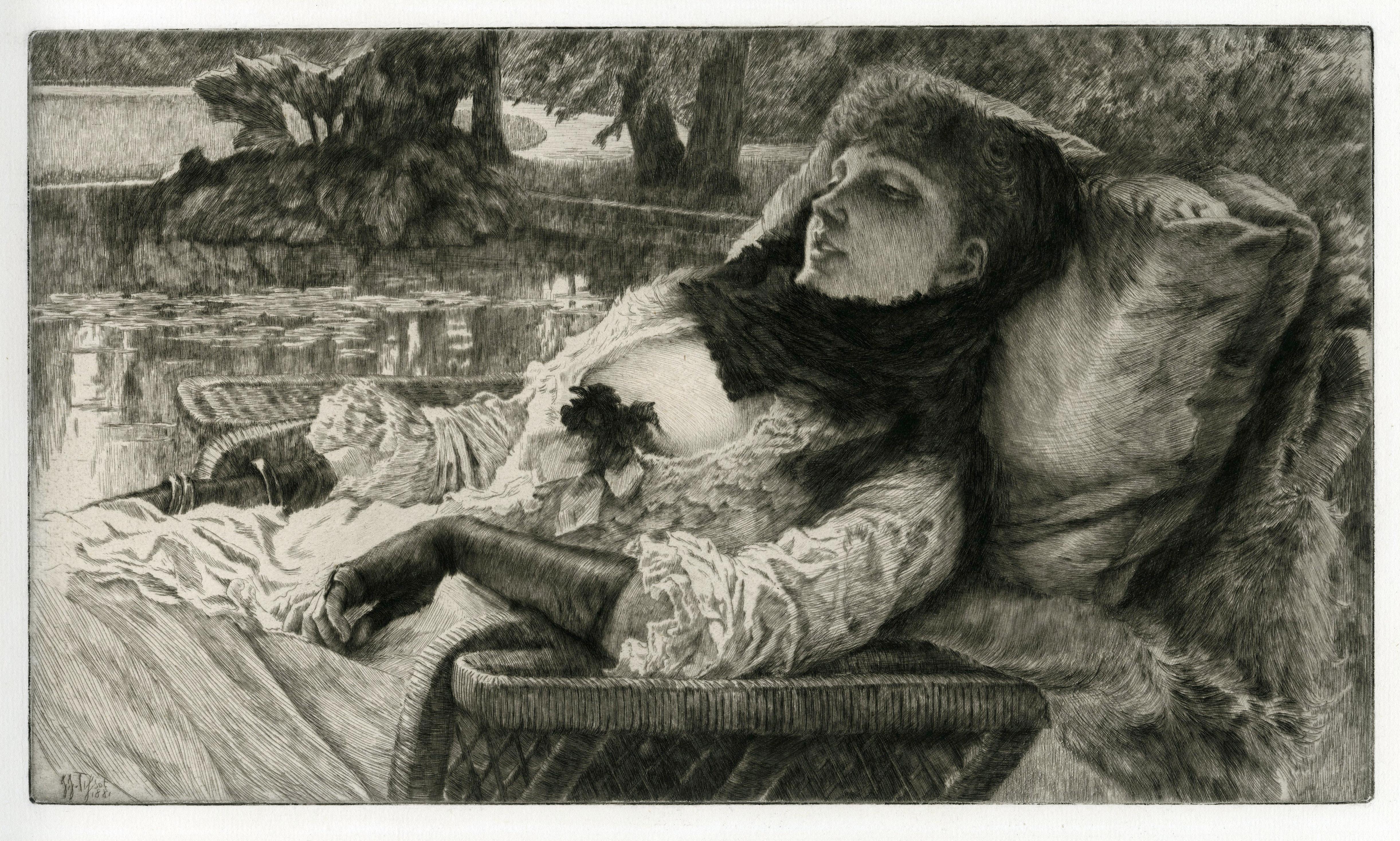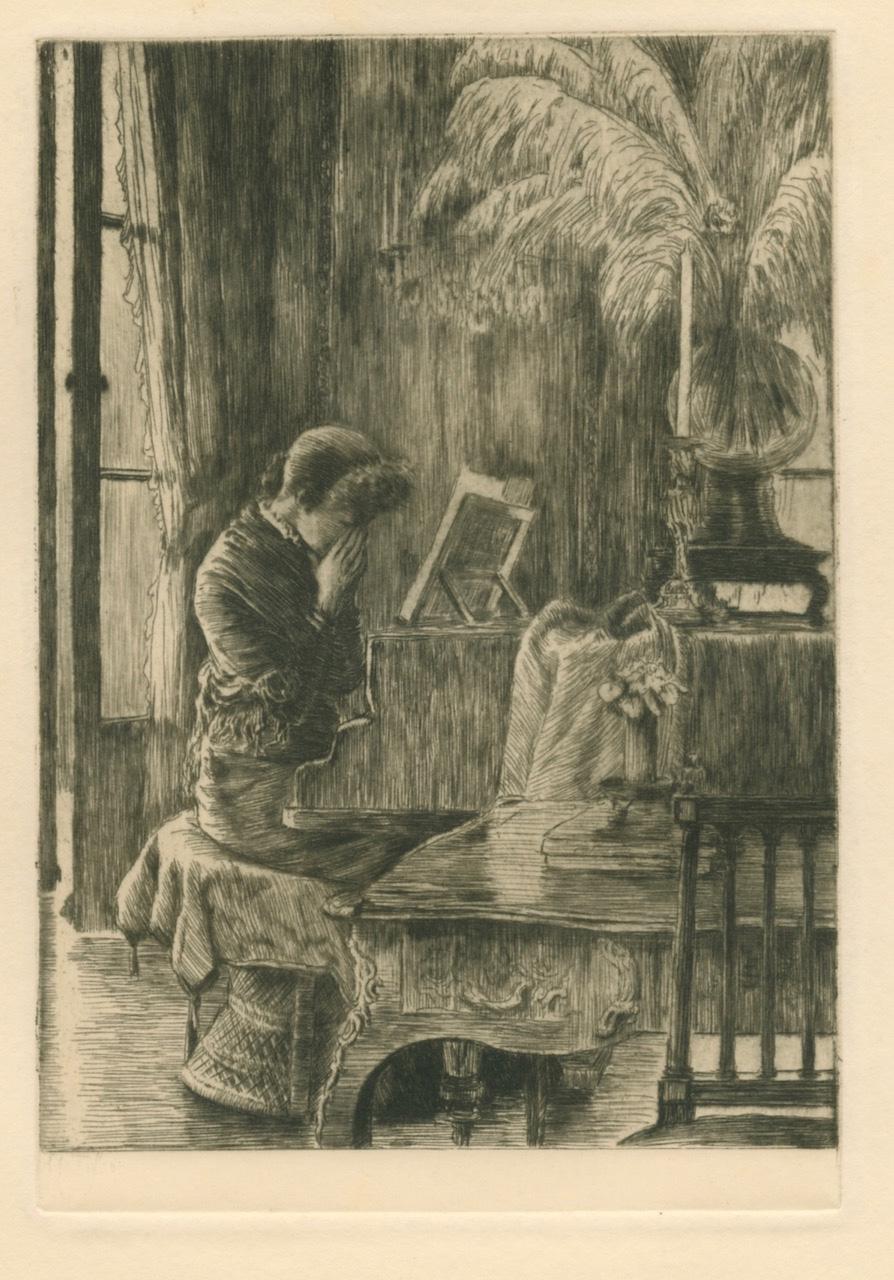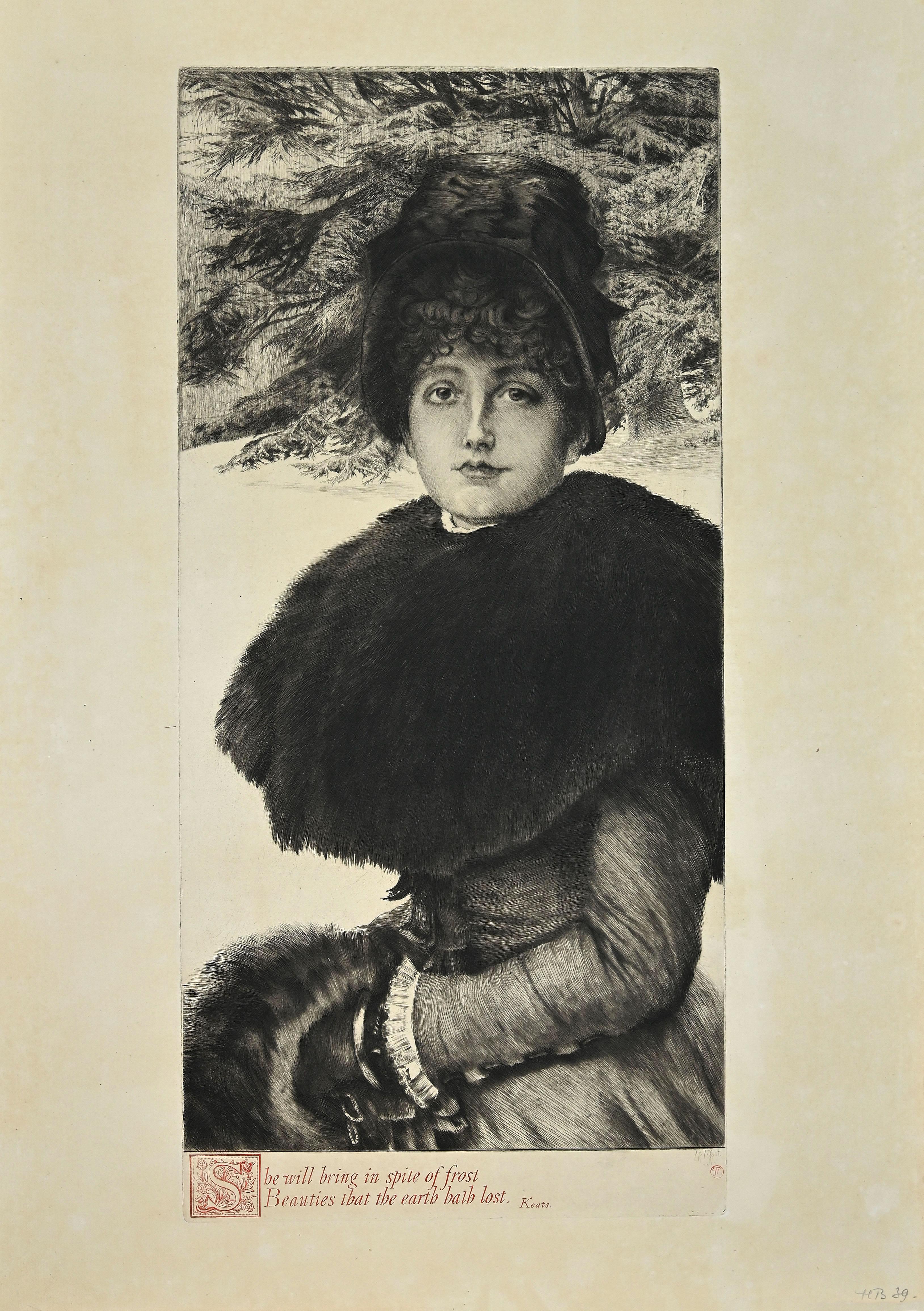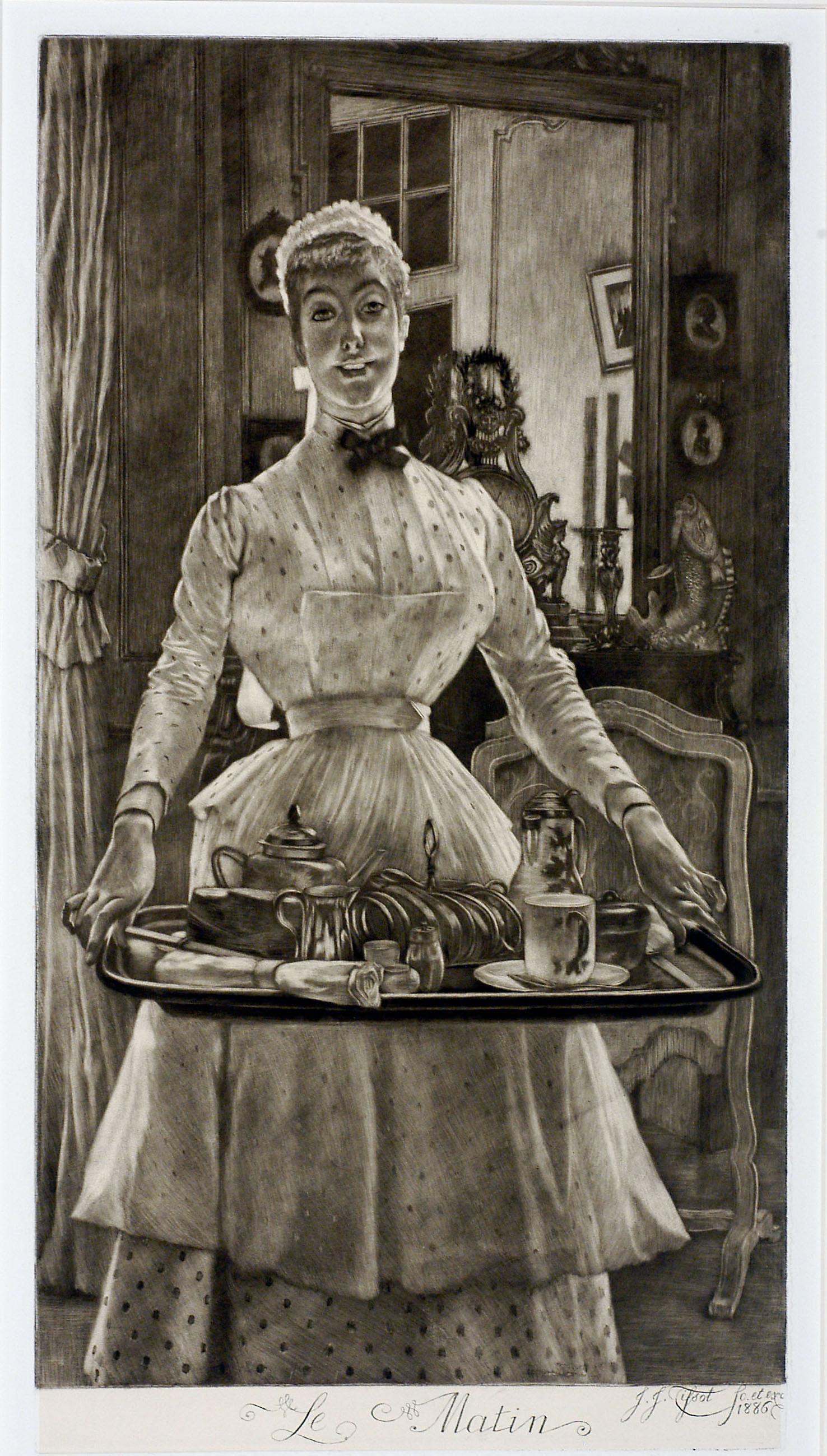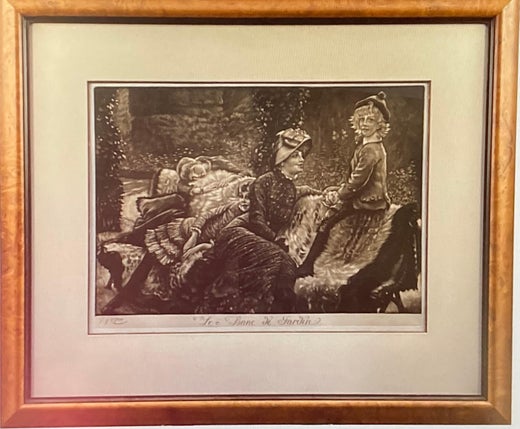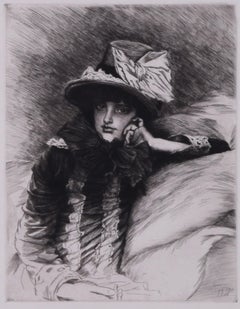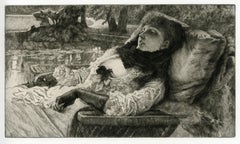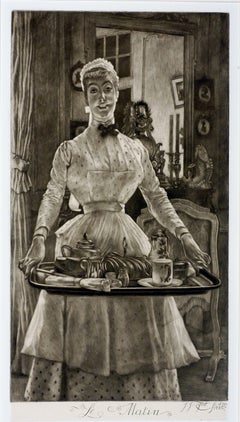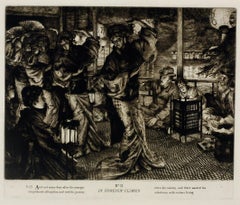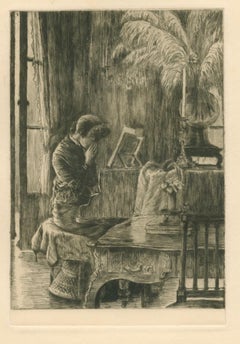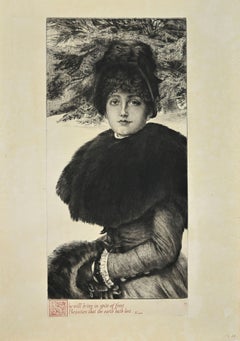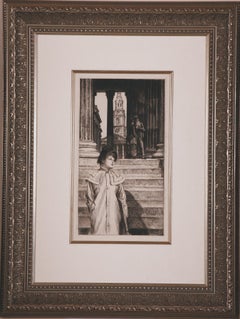Items Similar to Au bord de la mer (At the Sea Side)
Want more images or videos?
Request additional images or videos from the seller
1 of 7
James Jacques Joseph TissotAu bord de la mer (At the Sea Side)1880
1880
$5,750
£4,429.13
€5,057.55
CA$8,202.50
A$8,972
CHF 4,708.29
MX$107,300.18
NOK 59,418.32
SEK 55,430.12
DKK 37,770.60
About the Item
Au bord de la mer (At the Sea Side)
Etching and drypoint, 1880
Signed in the plate middle left edge (see photo)
Edition: c. 100
A very rich impression, full of burr and contrasts
Printed on medium weight Dutch paper, with a partial Blauw watermark.
This usage of the Dutch paper is indicative of the first printing in London
Reference: Wentworth 47
Provenance: Sagot Heirs
Condition: Excellent
The sheet has appropriate aging for being 140 plus years old
Plate size: 14 7/8 x 5 3/8 inches
Sheet size: 16 1/8 x 6 3/8 inches
Frame: 30-3/4 x 19-3/8 x 1-3/4"
James Jacques Joseph Tissot
Jacques-Joseph Tissot was born in 1836, in Nantes in a seaport on the French coast. Throughout his life Tissot retained an affinity and fascination with all things nautical, and his marked ability to accurately paint rigging and shipboard scene paintings must have come from his boyhood. The son of a prosperous shopkeeper who was a devout Roman Catholic, the young Tissot was sent away to a boarding school run by Jesuits. Although initially unenthusiastic about the prospect of his son becoming an artist, Tissot senior eventually accepted the inevitability of his son's artistic pretensions.
In 1856 Tissot went to Paris to train as a painter. Here, at the Ecole des Beaux Arts the young Tissot met the young James McNiell Whistler (1834-1903), one of the most celebrated and unusual figures in 19th century art. At about this time Tissot also met, and became a friend of Degas (1834-1917) the Impressionist painter. Like Alma-Tadema, and Edward Burne-Jones, Tissot changed his name at this time to draw attention to himself. In his case he anglicized his Christian name to James. Tissot inherited the shrewd commercial instincts of his father, and like Alma-Tadema and Millais, was a painter-entrepreneur. In the 1860s he visited Italy, and in 1862 London. In 1864 Tissot exhibited his oil paintings at the Royal Academy for the first time, suggesting that he realized the potential of London as a source of wealthy patrons. He began to concentrate on contemporary scene paintings. In 1869 he produced caricatures for Vanity Fair magazine, including a brilliant caricature of the elegant, sophisticated Frederic Leighton at an evening reception.
Following the defeat of France and the occupation of Paris during the Franco-Prussian war, Tissot fled to England where he had a considerable number of contacts. He was initially the guest of the Editor of Vanity Fair, with whom he had become friendly, and who seems to have opened doors for him both socially and professionally. Tissot, hard working and shrewd, quickly became successful in London, where his oil paintings of social events and his conversation pieces rapidly became popular. These paintings look beautifully painted and were an interesting record of social life at the time, but were controversial. This was the time when commercially successful people were overtaking the landed aristocracy in wealth and as arts patrons. In some quarters Tissot’s paintings were regarded as depictions of the nouveau-riche. Ruskin was a particularly severe critic, describing them as "mere painted photographs of vulgar society." In 1873, Tissot bought the house in St John's Wood where he would live for the rest of his time in London, and started to become a significant figure socially. Tissot's success in London was regarded with envy by Degas and other painters of his circle in Paris.
In the mid 1870s Tissot met Kathleen Newton (1854-1882), an Irish divorcee with a distinctly colorful past. She had formed a sexual relationship with a man on a voyage to India to be married, and borne his child. Kathleen became Tissot’s model, muse, mistress, and the great love of his life. Many other successful men kept mistresses in St John's Wood, but they did not, like Tissot, live openly with them in adulterous relationships. This situation forced the painter to choose between his social life and Kathleen. To his credit he chose his lady. It would be wrong to think that Tissot became something of a hermit, as he and Kathleen Newton entertained their more bohemian artistic friends at home. But Tissot's days as a man-about-town were over, and he and Kathleen seem to have settled into a quiet life of domesticity. Kathleen's two children lived close by with her sister. Kathleen Newton was an extremely attractive young woman, and appeared in many of Tissot paintings at this time. In the late 1870s her health started to decline, with the onset of that great 19th century killer Tuberculosis. Tissot remained devoted to her. It is likely that the Roman Catholicism of both would not allow them to contemplate marriage. In 1882, the desperately ill Kathleen cheated consumption by committing suicide, and, as a result was not able to be buried in consecrated ground. With one week Tissot left his home at St Johns Wood, and never returned to it. The house was later bought by Alma-Tadema.
Tissot was devastated by his loss, and never really recovered from it. He seemed unable to accept the enormity and permanence of it. It is rumored that he considered marriage to other women later in life, but these affairs came to nothing. Like many English people at this time Tissot became interested in Spiritualism, and on a number of occasions tried to contact the dead Kathleen. The exotic French artist and his fallen women-one of the great 19th century English love stories. Initially Tissot carried on working back in Paris, in much the same manner as in London. Tissot produced a series of paintings of attractive, beautifully dressed women in sumptuous surroundings. These paintings were, for a time, extremely fashionable. Following this Tissot experienced a profound religious experience, and became increasingly devout. Tissot embarked on a series of religious paintings, visiting the Middle East on a number of occasions, to observe and paint backgrounds for his oil paintings. These paintings were well-received at the time, but in our more secular age have little appeal. James Tissot died on Friday 8th August 1902. Courtesy: James Tissot web site
- Creator:James Jacques Joseph Tissot (1836-1902, French)
- Creation Year:1880
- Dimensions:Height: 16.13 in (40.98 cm)Width: 6.38 in (16.21 cm)
- Medium:
- Movement & Style:
- Period:
- Condition:
- Gallery Location:Fairlawn, OH
- Reference Number:Seller: FA45701stDibs: LU14015623232
James Jacques Joseph Tissot
Jacques Joseph Tissot (French: [tiso]; 15 October 1836 – 8 August 1902), Anglicized as James Tissot (), was a French painter and illustrator. He was a successful painter of Paris society before moving to London in 1871. He became famous as a genre painter of fashionably dressed women shown in various scenes of everyday life. He also painted scenes and figures from the Bible.
About the Seller
5.0
Recognized Seller
These prestigious sellers are industry leaders and represent the highest echelon for item quality and design.
Gold Seller
Premium sellers maintaining a 4.3+ rating and 24-hour response times
Established in 1978
1stDibs seller since 2013
828 sales on 1stDibs
Typical response time: <1 hour
Associations
International Fine Print Dealers Association
- ShippingRetrieving quote...Shipping from: Fairlawn, OH
- Return Policy
More From This Seller
View AllBerthe
By James Jacques Joseph Tissot
Located in Fairlawn, OH
Berthe
Etching with drypoint, 1883
Signed in the plate (see photo)
This etching was inspired by an 1882/3 pastel which the artist included in his ambitious "Femme a Paris" exhibition at Galerie Sedelmeyer, Paris, in 1885.
Reference: Beraldi 65
Wentworth 74, published state
Tissot 76
Condition: Excellent
Plate/Image size: 14 1/4 x 11 inches
Sheet size: 19 1/2 x 15 inches
Frame size: 23-1/2 x 20-1/4 inches
Donald Morris Gallery, Birmingham, Michigan (Morris had a distinguished collection of Tissot prints...
Category
1880s Impressionist Portrait Prints
Materials
Etching
Soirée d'été (Summer Evening)
By James Jacques Joseph Tissot
Located in Fairlawn, OH
Soirée d'été (Summer Evening)
Etching & drypoint, 1881
Signed and dated in the plate lower left corner
Edition: c. 100 in both states; plate canceled
Tissot's lover, Irish divorcee ...
Category
1880s Impressionist Portrait Prints
Materials
Etching
Le Matin (Morning)
By James Jacques Joseph Tissot
Located in Fairlawn, OH
Le Matin (Morning)
Mezzotint, 1886
Signed and dated in the plate (see photos)
Edition: at least 650 impressions in both states
Reference: Wentworth 82 ii/II
Provenance: Heirs of Edmu...
Category
1880s French School Interior Prints
Materials
Mezzotint
L'enfant prodigue: en pays etranger (The Prodigal Son: In Foreign Climes)
By James Jacques Joseph Tissot
Located in Fairlawn, OH
L'enfant prodigue: en pays etranger (The Prodigal Son: In Foreign Climes)
Etching, 1881
Unsigned (as usual for this state)
From: L'enfant prodigue, (The Prodigal Son, five plates)
Ed...
Category
1880s Impressionist Figurative Prints
Materials
Etching
L'enfant prodigue: en pays etranger (The Prodigal Son: In Foreign Climes)
By James Jacques Joseph Tissot
Located in Fairlawn, OH
L'enfant prodigue: en pays etranger (The Prodigal Son: In Foreign Climes)
Etching, 1881
Unsigned (as usual for this state)
From: L'enfant prodigue, (The Prodigal Son, five plates)
Ed...
Category
1880s Impressionist Figurative Prints
Materials
Etching
Le banc de jardin (The Garden Bench)
By James Jacques Joseph Tissot
Located in Fairlawn, OH
Le banc de jardin (The Garden Bench)
Mezzotint and engraving on cream chine collé laid down on ivory wove paper, 1883
Signed in the plate (see photo)
Condition: Brilliant impression...
Category
1880s Impressionist Figurative Prints
Materials
Mezzotint
You May Also Like
Renée Mauperin; Ten Etchings, Complete Set for novel by Goncourt Brothers
By James Jacques Joseph Tissot
Located in Middletown, NY
Renée Mauperin; Ten Etchings, Complete Set for the Illustrations to the Novel by Edmond and Jules de Goncourt 1882
Paris: G. Charpentier et Cie, 1882-1884.
The complete set of ten ...
Category
Late 19th Century Realist Interior Prints
Materials
Etching
Promenade dans la Neige - Etching by J. Tissot - 1880
By James Tissot
Located in Roma, IT
Beautiful print on verge crème, 2° state on 3, with letters printed in red. Stamp “Lugt 1545”.
Little crack and fold on lower left margin of the sheet.
Some small traces of oxidati...
Category
1880s Post-Impressionist Portrait Prints
Materials
Drypoint, Etching
Querelle d'amoureux. (Quarreling). 1
By James Tissot
Located in Storrs, CT
En plein soleil. (In the Sunlight). 1881. Etching and drypoint. Tissot 54, Béraldi 45, Wentworth 54. 7 13/16 x 11 1/2 (sheet 11 1/4 x 15). Edition about 100. Mat line and two hinge s...
Category
19th Century Impressionist Figurative Prints
Materials
Drypoint, Etching
$2,800 Sale Price
20% Off
Le Portique de la Galerie Nationale a Londres by J.J. Tissot
By James Jacques Joseph Tissot
Located in Hinsdale, IL
J.J. Tissot
Le Portique de la Galerie Nationale a Londres
(The Portico of the National Gallery, London)
Wentworth 40
Etching and Drypoint on imitation Japanese paper, C. 1878
Only st...
Category
1890s Realist Prints and Multiples
Materials
Drypoint, Etching
$4,400 Sale Price
20% Off
"Reverie"
By James Jacques Joseph Tissot
Located in Astoria, NY
James Jacques Joseph Tissot (French, 1839-1906), "Reverie", Etching and Drypoint on Laid Paper, 1889, silvered wood frame. Image: 9" H x 4.5" W; frame: 14.75" H x 10" W. Provenance: ...
Category
1880s Figurative Prints
Materials
Laid Paper, Drypoint, Etching
Le Matin - Etching by James Tissot - 1886
By James Tissot
Located in Roma, IT
Wonderful mezzotint and etching on China paper applied. The inscription reads: "Le matin/ J. J. Tissot Sc. et ex. 1886". Titled, signed and dated on plate on the lower margin, below ...
Category
1880s Modern Figurative Prints
Materials
Etching, Aquatint
